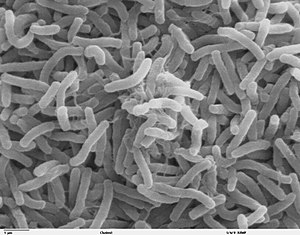‘Superbugs’ versus Modern Medicine: Unvanquished, Ancient Scourges of Humanity Return with a Vengeance
Published on November 16th, 2013
The historic discovery of penicillin in 1928 by Scottish biologist Alexander Fleming revolutionized modern medicine. This first of the antibiotics allowed doctors to successfully treat billions of patients suffering from common infections that had often produced fatal outcomes since time immemorial.
Antibiotics are used to treat infections caused by bacteria – microscopic, simple organisms of ancient lineage. Some bacteria are pathogenic, or disease-causing.
Many bacteria are benign or even beneficial; indeed, scientists have discovered that each human body is a microbiome or ecosystem unto itself. Incredibly, each of us provides “habitat” hosting enormous communities of several thousand species of bacteria that, altogether, actually comprise ten times the total number of cells carrying our own DNA (i.e., that are “us”)!
Because bacterial cells are so tiny, even though they outnumber ours, they constitute only 1-3% of our body’s combined mass or weight. We enjoy a “symbiotic” or mutually beneficial relationship with many or most of these bacterial lodgers.
But there have always been many harmful bacteria and other microbes in the environment that attack us. To them we are first and foremost a food source – that is, a prey item in their diets, like a moose to a wolf, or host to a parasite. Seven billion human beings represent a massive food source for opportunistic organisms to feast on.
Antibiotics and vaccines are two of the chief weapons in humanity’s arsenal against ancient scourges that represented a persistent downward pressure on human populations. By lowering the death rate drastically, antibiotic “miracle drugs” contributed in no small way to the global human population explosion in the latter half of the 20th century, during which a billion new humans were being added almost every decade.
Of course, these billions of people have produced staggering environmental impacts, one of which is eradicating countless other wild creatures that are edible or otherwise fell victim to what we once called “progress.” Yet it is a mistake to perceive other species solely as passive victims of the emerging reign of Homo sapiens on Earth. Our ever more pervasive presence on the planet also has benefited any number of species that hitched their wellbeing to ours, like pets, livestock, wily opportunists (e.g., coyotes, crows, pigeons, rats and cockroaches), microbiota and pathogens.
Nature is never static and species are ever evolving. Microbes evolve faster than larger, more complex organisms because of their vast numbers, simplicity and compressed life cycles. By introducing antibiotics into the microbial environment, humans inadvertently created what evolutionary biologists call “selection pressure” for those bacteria that could survive our chemical onslaught, and emerge as “superbugs” able to wreak havoc.
Bacteria continually evolve resistance to antibiotics. Fleming himself warned of this back in 1945 in his Nobel Prize acceptance speech. In an all-too-typical case of human folly, we have unwittingly hastened this inevitable, natural process, to our own demise, by “rampant overuse and misuse of antibiotics.” We may now be approaching the end of the antibiotic era. What lies beyond is uncertain and frightening.
A recent, harrowing PBS Frontline episode highlighted our dilemma. Dr. Arjun Srinivasan, associate director of Centers for Disease Control and Prevention (CDC), told Frontline that the age of antibiotics has come to an end.
Overcrowding and poor environmental hygiene only intensify human vulnerability to our microbial enemies.
Nearly two centuries apart, Thomas Robert Malthus and Paul Ehrlich warned that if humans did not control population humanely, nature would cruelly, and disease is one of nature’s main culling mechanisms. We may now be on the verge of losing our principal protection.
Not to put too fine a point on it, but this is not the best way to address overpopulation.








